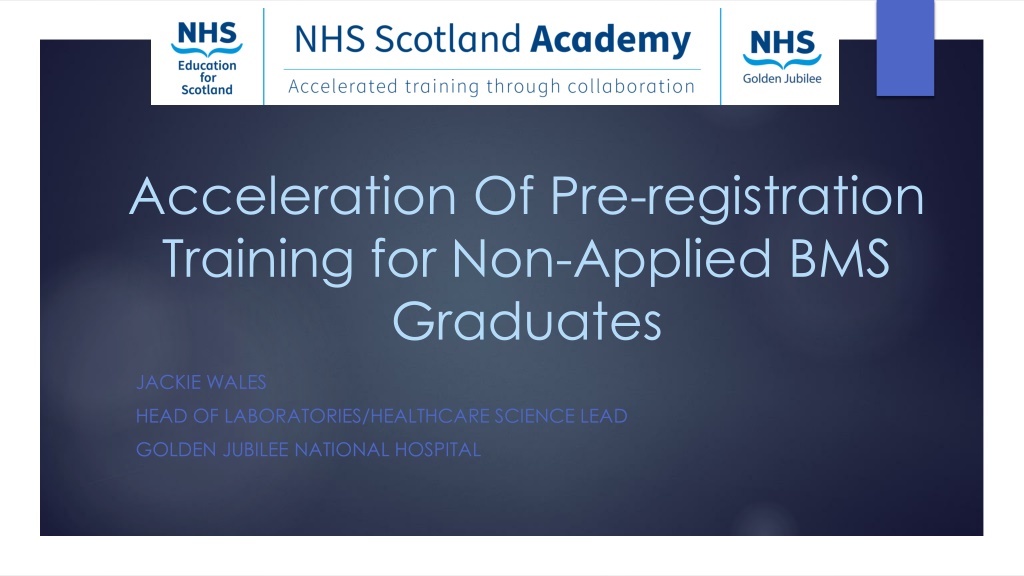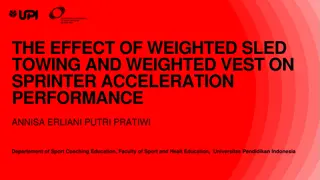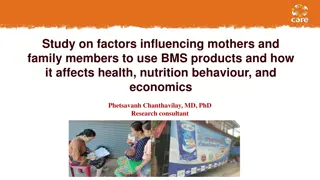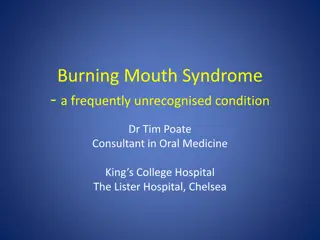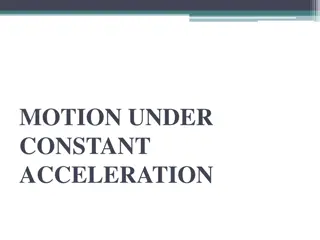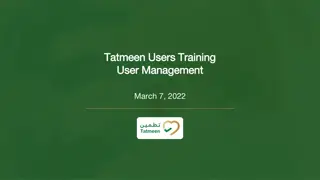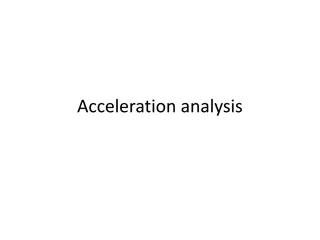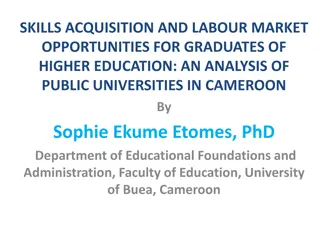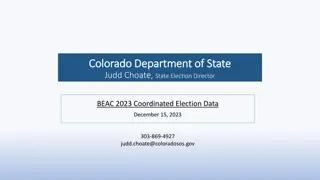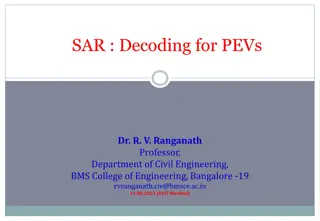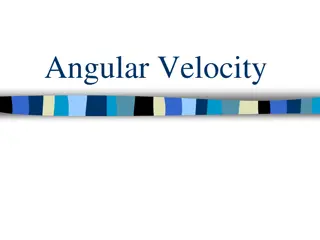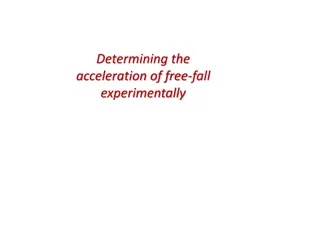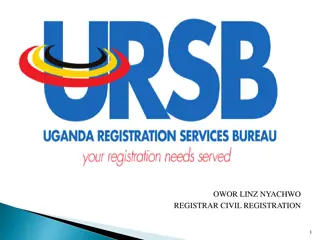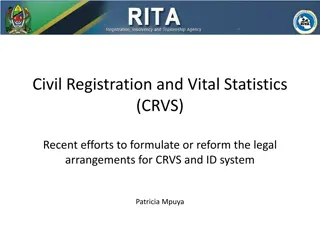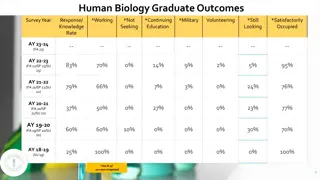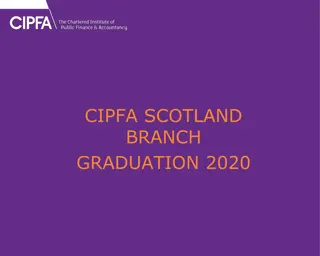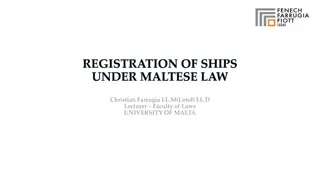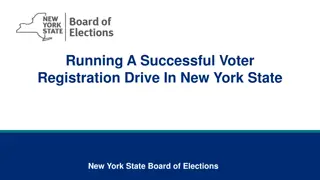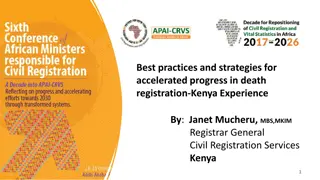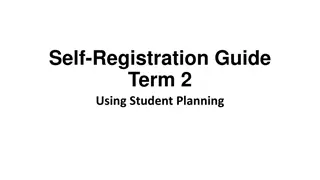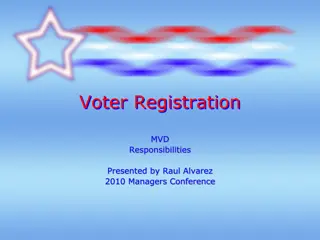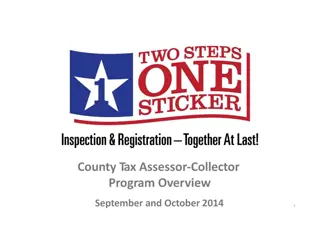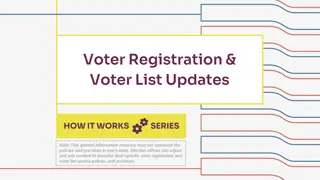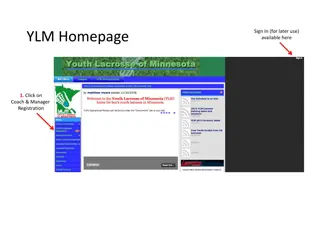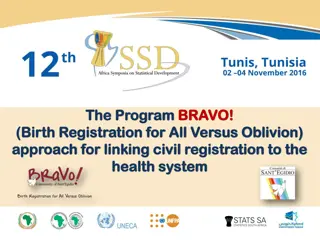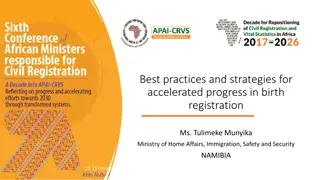Acceleration of Pre-registration Training for Non-Applied BMS Graduates
Addressing workforce challenges in Biomedical Science, this proposal aims to enhance training and recruitment strategies to meet the increasing demand for skilled professionals. The initiative includes a recap of BMS journey in Scotland, outlining the role of NHS Scotland Academy in facilitating the program. By summarizing survey results and mapping the portfolio, the project intends to streamline and optimize training pathways for non-applied BMS graduates, aligning with national workforce strategies and policies for healthcare sector improvement.
Download Presentation

Please find below an Image/Link to download the presentation.
The content on the website is provided AS IS for your information and personal use only. It may not be sold, licensed, or shared on other websites without obtaining consent from the author. Download presentation by click this link. If you encounter any issues during the download, it is possible that the publisher has removed the file from their server.
E N D
Presentation Transcript
Acceleration Of Pre-registration Training for Non-Applied BMS Graduates JACKIE WALES HEAD OF LABORATORIES/HEALTHCARE SCIENCE LEAD GOLDEN JUBILEE NATIONAL HOSPITAL
Purpose Current workforce challenges Scottish Government Policy Recap on the BMS journey in Scotland Role of NHS Scotland Academy To summarise the proposal submitted to the NHS Scotland Academy in August 2022 To describe the benefits of this programme Progress through NHS Scotland Academy Executive Programme Board Summarise survey results Challenges Mapping the portfolio Next steps
Workforce Challenges Lack of experienced Biomedical Scientists applying for vacancies Limited number of integrated graduates with HCPC registration Increased number of retirements leading to loss of experience Increased number of short & long term sickness/absence Increased workload
National Workforce Strategy for Health & Social Care Recovery Grow the workforce at the same time as transforming how we work to improve capacity Growth Transformation
The Health & Care (Staffing)(Scotland) Act 2019 The Act aims to enable high quality care and improved outcomes for people using services in both health and care by helping to ensure appropriate staffing
Scottish Government Policy Outputs from above may support additional workforce at a time when recruitment is a challenge
Recruitment & retention Modernisation Board Recommendations 2006-2007 Biomedical Science Integrated degree route introduced first graduates 2009 Very successful in producing high quality graduates ready to enter the profession with HCPC registration Number of students on the applied route dependent on laboratories hosting students Number of students gaining placement in laboratories has decreased from year 1 by about 50% 60-70% of students graduating from IBMS accredited degrees in Scotland exit with a non-applied degree
Role of NHS Scotland Academy Partnership between NHS Golden Jubilee and NHS Education for Scotland to offer accelerated training for a wide range of health and social care roles and professions. Provide an opportunity for staff to improve their skills in specific areas, using residential, distance and virtual reality learning. Offer attractive training programmes linked to recruitment and career progression. Add to existing educational programmes and respond to evolving and emerging workforce needs.
Proposal Design and deliver a Once for Scotland accelerated training programme to support Biomedical Science graduates who have exited University with a non-applied IBMS Accredited degree allowing graduates to partially complete the Pre-Registration portfolio, therefore increasing their employability in Laboratories by reducing the time for completion of the portfolio in post
Summary of Paper 5 Universities in Scotland with IBMS accredited degrees 4 of the 5 also have HCPC approval and can offer an applied route with placements Number of placements available have reduced over the years due to various factors e.g. lab mergers Overview of the portfolio modules To design a postgraduate practice certificate for Biomedical Science graduates exiting with a non-applied BSc (Hons) degree that has been accredited by the IBMS to provide students with the opportunity to partially complete the registration portfolio. The design and delivery will require a collaborative approach between NHS Scotland Academy, Academia, NHS Golden Jubilee laboratories, the Institute of Biomedical Science, Scottish Government and representatives from the profession.
Benefits - Graduates Improved employability have commenced completion of pre-registration portfolio Once in employment, evidence for completion of the portfolio will be gathered simultaneously during discipline specific training Reduced time to verification while in employment and subsequent entry to the HCPC register Evidence collected in a specialist discipline may contribute to completion of the Specialist portfolio in the relevant discipline
Benefits - Employers Wider selection of suitable candidates to shortlist Reduced burden on training may encourage more laboratories to host placement students Programme delivery by NHS Scotland Academy will concentrate on topics delivered remotely allowing laboratories to focus on practical elements once in post No additional time commitment required from laboratory when compared with the employment of an applied student.
Timeline March 23 Updated SBAR presented to EPG & Approval granted to progress to Full Business case with support from key stakeholders February 2023 Survey issued electronically to employers - SBAR updated based on results August 2022 Draft Proposal submitted to NHSSA Executive Program Group (EPG) requested SBAR November 2022 SBAR presented to EPG Agreed to develop survey for employers
Survey Aim to get response from both Laboratory Managers and Training Managers Distributed through the clinical networks including, HATs, SMVN, SPAN & SCBN Total response rate was 34 with at least 1 response from every health board Overwhelming support for the proposal 87% 88% of lab managers would support the release of staff for design and delivery if required Currently approximately 100 portfolios being undertaken at the moment, the majority of which are in formal trainee roles
Challenges Application process, who will issue the portfolios? Cost of portfolio should the student pay to demonstrate commitment to enter profession? 30 pieces of evidence required for verification How many pieces of evidence could be generated from knowledge gained from the academy? Design content of course to be delivered by Academy? Establish method of delivery Cost of course development
Mapping the Portfolio Modules Students require to complete 10 modules and generate 30 pieces of evidence By the time they come to the academy they will have already completed their honour s project evidence for Research & Development module Degree certificate will be key evidence for Module 1 section 2 of the portfolio - Professional knowledge Professional conduct Professional Practice
Professional Conduct Module Academy Employment Personal Responsibility & Development 2 1 Equality & Diversity 2 1 Communication 1 2 Patient records & Data Handling 1 2 Professional Relationships 0 3
Professional Conduct Role of the HCPC including the various standards that will impact them as a registrant i.e. Code of Conduct Performance & Ethics, Standards for CPD and the importance of fitness to practice Awareness of other key organisations e.g. UKAS, MHRA, IBMS Methods of communication and the importance of interpersonal skills Data Protection and Patient confidentiality Inter-relationships with other professions, the importance of the multi- disciplinary team and the contribution Biomedical Science makes to the patient journey
Professional Practice Module Academy Employment Application of Professional Knowledge 0 2 Health & Safety 2 1 Quality 1 2 Performing Standard Investigations 0 3 Research & Development Honours Year
Professional Practice Health & Safety Legislation. Preparation of COSHH and Risk assessments. Quality Management Systems Document Control, Incident Management, Equipment Management, Training & Competency, Research & Development support candidates to select evidence from their honours project
Next Steps Convene high level stakeholder group representative of NES, IBMS, Profession & Academy Use initial discussion to formulate a business case Present business case to Executive Programme Board Identify key stakeholders to design the content based on mapping exercise Establish best method for delivery Seek advice and endorsement from the IBMS
